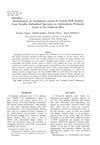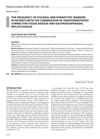 14 citations,
April 2009 in “Acta Medica Scandinavica”
14 citations,
April 2009 in “Acta Medica Scandinavica” Minoxidil helps control blood pressure but has side-effects, so it's not for everyone.
 40 citations,
January 2010 in “Annales D Endocrinologie”
40 citations,
January 2010 in “Annales D Endocrinologie” The French Endocrine Society suggests diagnosing PCOS with two of three signs, recommends lifestyle changes and clomiphene for treatment, and calls for more research on certain treatments and tests.
[object Object]  23 citations,
January 2005 in “Nihon Ishinkin Gakkai zasshi”
23 citations,
January 2005 in “Nihon Ishinkin Gakkai zasshi” Nested PCR can reliably identify fungal infections when traditional methods fail.
 78 citations,
November 2008 in “Fertility and Sterility”
78 citations,
November 2008 in “Fertility and Sterility” Amenorrhea is relatively rare and initial testing should check FSH, TSH, and prolactin levels.
 1 citations,
October 2008 in “Expert Review of Dermatology”
1 citations,
October 2008 in “Expert Review of Dermatology” Frontal Fibrosing Alopecia is a slowly progressing hair loss condition, likely underdiagnosed, with ineffective treatments, needing more research to understand it fully.
 February 2024 in “Curēus”
February 2024 in “Curēus” Regional nerve blocks are better than ring blocks for pain relief during PRP hair treatment.
May 2021 in “Research journal of topical and cosmetic sciences” TrichovitalsTM improved skin, hair, and nail health in adults after 12 weeks.

research Acne
231 citations,
April 2005 in “The New England Journal of Medicine” Acne affects most teenagers and can continue into adulthood, with various treatments available that show improvement but have concerns like antibiotic resistance and side effects.
 24 citations,
March 2003 in “Best Practice & Research Clinical Endocrinology & Metabolism”
24 citations,
March 2003 in “Best Practice & Research Clinical Endocrinology & Metabolism” Androgens, male hormones, play a role in both men and women's health, and testosterone therapy can help women with low levels, but it's not suitable for pregnant or lactating women, or those with certain conditions.
 1 citations,
May 2009 in “Wiley-Blackwell eBooks”
1 citations,
May 2009 in “Wiley-Blackwell eBooks” Early treatment of PCOS in teens is crucial to prevent long-term health issues like diabetes and heart disease.
 9 citations,
June 2002 in “Best Practice & Research in Clinical Obstetrics & Gynaecology”
9 citations,
June 2002 in “Best Practice & Research in Clinical Obstetrics & Gynaecology” Testosterone therapy can help women with androgen deficiency by improving energy, sex drive, and bone health with few side effects.
 2 citations,
April 2019 in “Медицинский совет”
2 citations,
April 2019 in “Медицинский совет” Combined oral contraceptives improve skin, hormone levels, and quality of life in women with PCOS.
[object Object]  18 citations,
January 1999 in “CNS Drugs”
18 citations,
January 1999 in “CNS Drugs” Some anticonvulsant drugs can cause skin reactions, ranging from mild to severe, and managing these reactions is important for patient care.
 49 citations,
January 1994 in “The Journal of Steroid Biochemistry and Molecular Biology”
49 citations,
January 1994 in “The Journal of Steroid Biochemistry and Molecular Biology” RU 58841 may treat acne, hair loss, and excessive hair growth.
 February 2015 in “Vestnik dermatologii i venerologii”
February 2015 in “Vestnik dermatologii i venerologii” The document doesn't provide enough information to summarize.
 12 citations,
January 2010 in “Pediatric Health”
12 citations,
January 2010 in “Pediatric Health” Early treatment and lifestyle changes are important for managing PCOS in young people to prevent long-term health issues.
 December 2020 in “Skin appendage disorders”
December 2020 in “Skin appendage disorders” Finasteride may effectively treat hair loss in Klinefelter Syndrome patients.
 18 citations,
June 2010 in “Journal of Chromatography B”
18 citations,
June 2010 in “Journal of Chromatography B” New method measures finasteride in blood quickly and accurately.
 7 citations,
August 2019 in “Journal of Ovarian Research”
7 citations,
August 2019 in “Journal of Ovarian Research” Blood removal and birth control pills both helped with hormone levels in women with PCOS, but birth control was better for regular periods and blood removal had fewer side effects.
 1 citations,
January 2022 in “Transgender health”
1 citations,
January 2022 in “Transgender health” Hormone therapy in transgender individuals can increase acne and affect hair growth and loss.
 November 2023 in “Turkish journal of botany”
November 2023 in “Turkish journal of botany” Türkiye uses many local plants to treat skin problems.
 5 citations,
January 2020 in “Wiadomości lekarskie (Warsaw Poland)”
5 citations,
January 2020 in “Wiadomości lekarskie (Warsaw Poland)” Patients with both connective tissue disease and acid reflux are more likely to have certain symptoms and physical signs.
 December 2023 in “Clinical Cosmetic and Investigational Dermatology”
December 2023 in “Clinical Cosmetic and Investigational Dermatology” An 8-year-old Saudi boy was diagnosed with a rare genetic disorder causing hair loss, skin issues, and light sensitivity.
 26 citations,
March 2014 in “Arquivos Brasileiros De Endocrinologia E Metabologia”
26 citations,
March 2014 in “Arquivos Brasileiros De Endocrinologia E Metabologia” The document concludes that proper diagnosis and combined treatments are key for hirsutism management, and weight loss may help overweight patients.
 2 citations,
April 2023 in “JEADV. Journal of the European Academy of Dermatology and Venereology/Journal of the European Academy of Dermatology and Venereology”
2 citations,
April 2023 in “JEADV. Journal of the European Academy of Dermatology and Venereology/Journal of the European Academy of Dermatology and Venereology” JAK-inhibitors for alopecia areata are generally safe with mostly mild side effects and a low rate of treatment withdrawal.
 5 citations,
June 2016 in “Dermatologic Surgery”
5 citations,
June 2016 in “Dermatologic Surgery” Hair restoration for East Asians should consider their unique characteristics like head shape, hair thickness, and hair density, and use modified procedures and treatments to minimize scarring and maintain hair density.
 January 2019 in “ISGE series”
January 2019 in “ISGE series” The document concludes that effectively managing PCOS requires a multifaceted approach.
 January 2019 in “ARC journal of pharmaceutical sciences”
January 2019 in “ARC journal of pharmaceutical sciences” Acne can be managed with various treatments and requires psychological support due to its emotional impact.
 October 1971 in “The BMJ”
October 1971 in “The BMJ” Hair loss can be linked to hormonal changes, and physical conditions like heart defects can cause depression.
 42 citations,
September 2018 in “Journal der Deutschen Dermatologischen Gesellschaft”
42 citations,
September 2018 in “Journal der Deutschen Dermatologischen Gesellschaft” Adult female acne requires a comprehensive treatment approach, including medical options and lifestyle changes, with attention to psychological well-being.





























